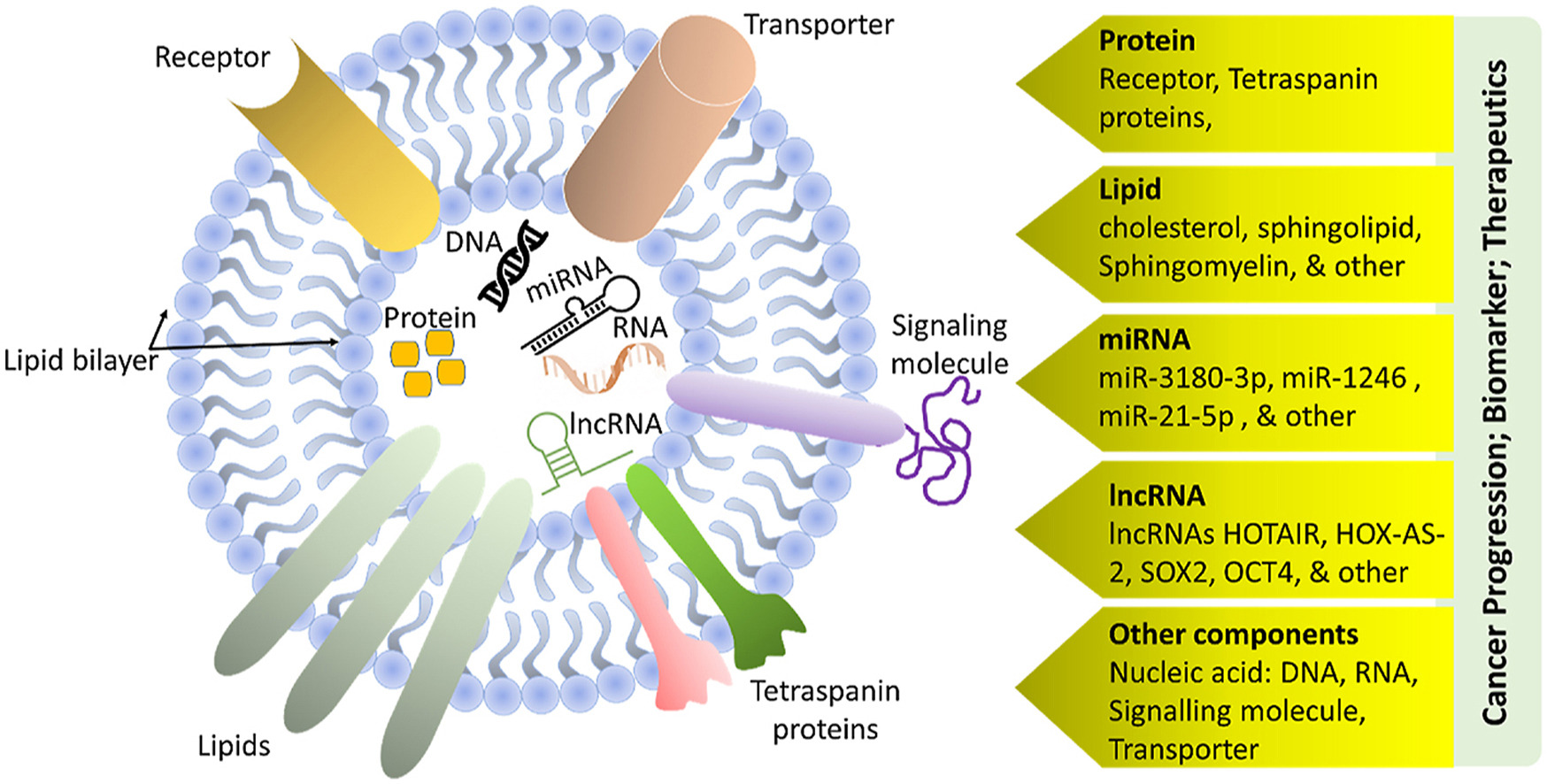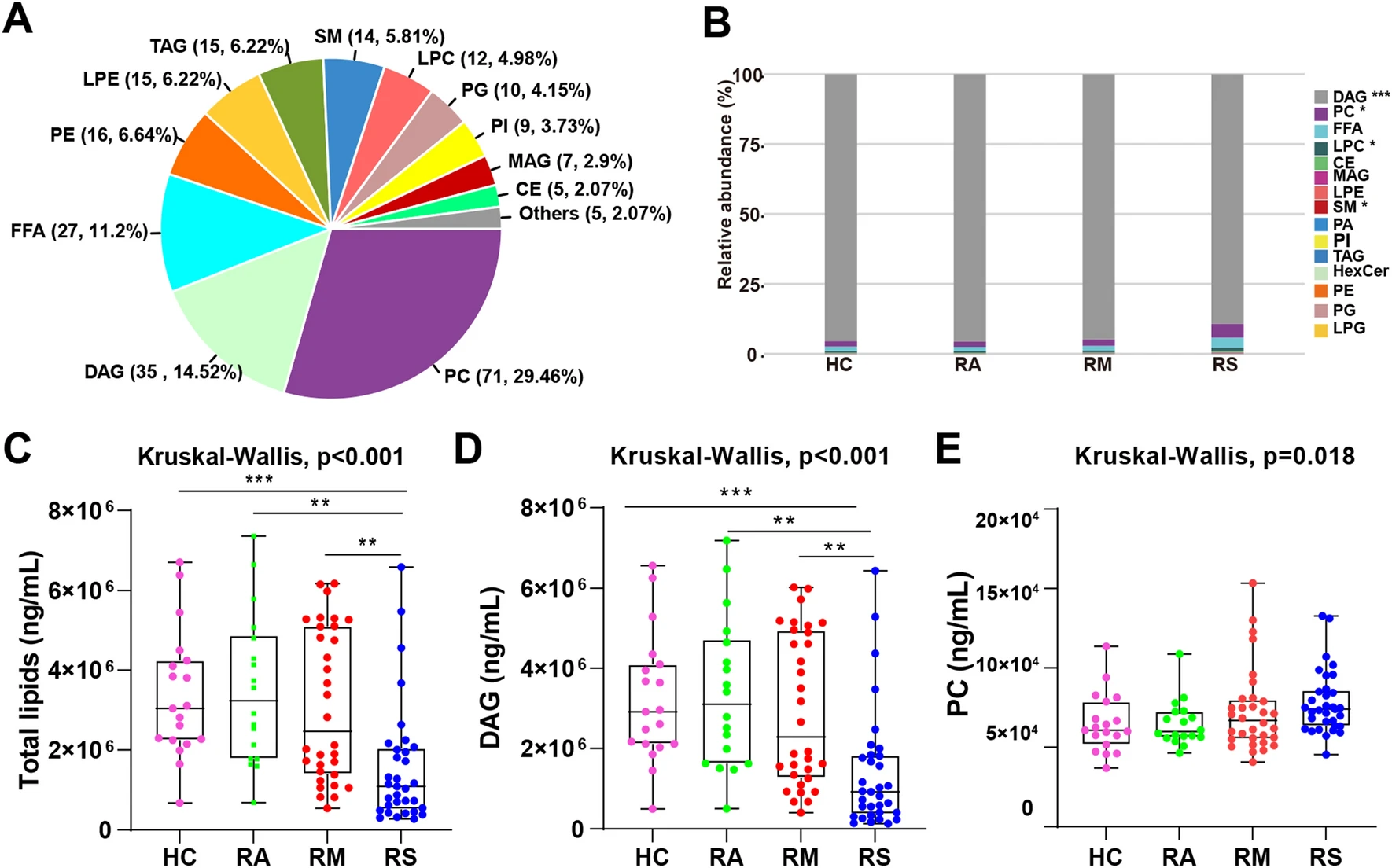Exosome Lipidomics & Metabolomics Service
Exosome Lipidomics & Metabolomics Service utilizes high-resolution mass spectrometry to comprehensively characterize lipid molecules and other small-molecule metabolites in exosomes, revealing their critical roles in areas such as biomarker discovery, signal transduction, tumor microenvironment regulation, and the design of nanodrug delivery systems.

Thakur A. et al. Bioactive Materials. 2021.
Exosomes are a type of nanoscale extracellular vesicles secreted by cells, which are widely involved in important biological processes such as intercellular signaling, immune regulation, and tumor microenvironment shaping. As key biological molecules, lipids and metabolites contained in exosomes not only determine the stability and transport function of exosome membranes, but also play a vital role in signal transduction, membrane remodeling, and energy metabolism. Exosome lipidomics refers to the comprehensive analysis of the composition, abundance, and dynamic changes of various lipids (such as phospholipids, cholesterol, sphingolipids, glycerides, etc.) in exosomes, revealing the exosome membrane structure, signal transduction, and disease-related lipid changes. Exosome metabolomics refers to the comprehensive detection of small molecule metabolites (such as amino acids, organic acids, sugars, nucleotides, etc.) in exosomes, and the analysis of the molecular mechanisms of exosomes in regulating metabolic pathways, cell communication, and disease development. By analyzing the lipid and metabolite profiles of exosomes, it is helpful to discover new biomarkers, reveal disease-related molecular mechanisms, and promote the application of precision medicine.
Relying on advanced chromatography and mass spectrometry platforms, MtoZ Biolabs provides Exosome Lipidomics & Metabolomics Service to systematically analyze lipids and metabolites in exosomes, helping researchers to deeply analyze the molecular composition and biological functions of exosomes, and facilitating disease research, diagnostic marker development, and new therapy exploration.
Analysis Workflow
1. Exosome Isolation and Verification
Isolate exosomes and perform quality checks to ensure purity and quality.
2. Sample Extraction
Lipid Extraction: Isolate exosomal membrane lipids and internal lipids.
Metabolite Extraction: Extract small-molecule metabolites from exosomes using solvent extraction methods.
3. Mass Spectrometry Analysis
High-resolution mass spectrometers (such as LC-MS/MS or GC-MS) are used for both qualitative and quantitative analysis of lipids and metabolites.
4. Data Analysis and Reporting
Perform data processing, statistical analysis, and bioinformatics analysis. Provide a detailed report, including but not limited to lipid and metabolite identification tables, volcano plots, heatmaps, and other relevant data visualizations.
Applications
Exosome Lipidomics & Metabolomics Service has broad applications in the following areas:
Biomarker Discovery
Analyze the lipid and metabolite composition of exosomes to identify early diagnostic biomarkers for diseases such as cancer, neurodegenerative diseases, and metabolic disorders.
Tumor Microenvironment Research
Uncover the molecular mechanisms by which tumor cells transport lipids and metabolites through exosomes to reshape the microenvironment, promoting tumor proliferation, invasion, and metastasis.
Immune Regulation
Study the role of immune-regulatory molecules carried by exosomes in infection, inflammation, and immune evasion, providing new therapeutic targets for immunotherapy.
Metabolic Pathway Analysis
Using exosome metabolomics to explore cellular energy metabolism and metabolic adaptability, offering new insights into metabolic disorders.
Nanodrug Carrier Development
Analyze the stability and functionality of exosomal membrane lipids to guide the design and optimization of drug delivery systems using exosomes.
Service Advantages
1. Advanced Analysis Platform: MtoZ Biolabs established an advanced Exosome Lipidomics & Metabolomics Service platform, guaranteeing reliable, fast, and highly accurate analysis service.
2. One-Time-Charge: Our pricing is transparent, no hidden fees or additional costs.
3. High-Data-Quality: Deep data coverage with strict data quality control. AI-powered bioinformatics platform integrates all Exosome Lipidomics & Metabolomics Service data, providing clients with a comprehensive data report.
4. One-Stop Service: From exosome isolation to metabolomics and lipidomics analysis, we provide comprehensive professional support throughout the entire process, saving clients time and effort, and helping them efficiently advance their research projects.
FAQ
Q. Why are Exosome Lipidomics and Metabolomics Important?
Exosome lipidomics and metabolomics help analyze the lipid and metabolite composition of exosomes, providing valuable insights into their roles in cell communication, disease progression, and other biological processes. By studying the lipid and metabolite composition of exosomes, researchers can understand their functions and potential applications across various fields, such as discovering key biomarkers and potential therapeutic targets.
Q. How Long does it Take to Receive Results From the Exosome Lipidomics & Metabolomics Service?
The service timeline depends on the complexity of the analysis and the number of samples being processed. Our team will work closely with you to provide an estimated delivery timeline for the results.
Deliverables
1. Comprehensive Experimental Details
2. Materials, Instruments, and Methods
3. Total Ion Chromatogram & Quality Control Assessment (project-dependent)
4. Data Analysis, Preprocessing, and Estimation (project-dependent)
5. Bioinformatics Analysis
6. Raw Data Files
Case Study
The study utilized exosome lipidomics to analyze the lipid composition of plasma-derived exosomes from COVID-19 recovery patients, revealing their lipid metabolic characteristics. The research found that, compared to healthy individuals, key lipids such as phospholipids, sphingolipids, and ceramides were significantly upregulated in sEVs from recovery patients, indicating persistent disruption in lipid metabolism. Some lipids associated with signal transduction (such as sphingomyelin, diacylglycerols) exhibited abnormal expression, suggesting that exosome-mediated immune regulation and inflammatory signaling could be reshaped. These findings highlight the presence of long-term lipid metabolism abnormalities during COVID-19 recovery and provide critical insights for future research into long COVID mechanisms and lipid biomarkers.

Xiao W. et al. Scientific reports. 2023.
How to order?







